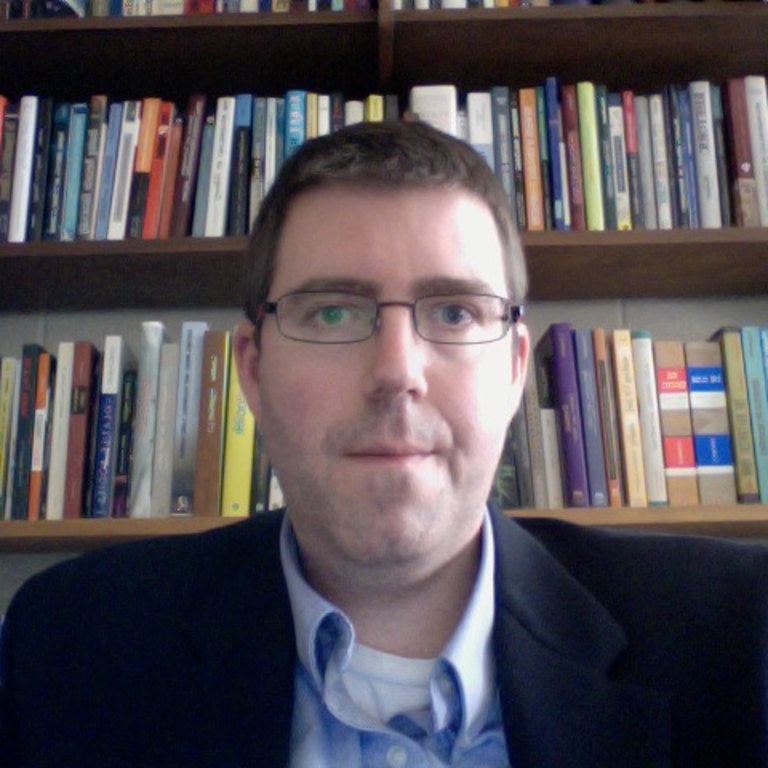- Ph.D., University of Wisconsin-Madison
- M.A., North Carolina State University
- B.A., Penn State University

Scot Barnett
he/him/his
Associate Professor, English

he/him/his
Associate Professor, English
My research and teaching interests include histories and theories of rhetoric, digital rhetorics, and the intersections between rhetoric and philosophy. In my most current research, I am interested in how rhetoricians’ conceptions and refusals of the nonhuman (from animals and things to technologies and natural phenomena) have informed understandings of rhetoric from antiquity to the present. Although rhetoric is often defined in terms of language—and thus bound closely to the agencies of human speakers and writers—my work examines the unheralded roles nonhuman beings have played in establishing an understanding of rhetoric as specific to “the human barnyard,” as Kenneth Burke says.
My book, Rhetorical Realism: Rhetoric, Ethics, and the Ontology of Things (Routledge, 2017), intervenes in recent debates surrounding new materialism and object-oriented ontology by considering objects that have accompanied discussions of rhetoric from antiquity to the present. At its heart, Rhetorical Realism seeks to dig deeper roots for new materialist and object-oriented theories within the history of rhetoric itself. As such, the book constitutes both a response and a contribution to contemporary rhetorical theory’s growing interest in nonhuman agents (objects, technologies, ecologies, and animals). For a discipline that often defines itself according to human speech and writing, the nonhuman poses a number of challenges and opportunities for rhetoric. To date, many of the responses to the nonhuman turn in rhetoric have focused on rhetoric’s compatibility with new conceptions of materiality, asking, for instance, if it is necessary to rethink rhetoric’s scope and meaning in order to accommodate nonhuman actors and agents. In Rhetorical Realism, I extend this work by transforming it into a new historiographic methodology attuned to the presence and occlusion of nonhumans and extra-human realities in rhetorical history. Through investigations of rhetoric’s place in Aristotelian metaphysics, the language invention movement of the seventeenth century, and postmodern conceptions of rhetoric as an epistemic art, my book expands the scope of rhetorical inquiry by showing how realist ideas have always helped to frame rhetoric’s meanings and limitations during key moments in its history. My argument, ultimately, is that all versions of rhetoric depend upon some realist assumptions about the world, most importantly, a reliance upon various mind-independent realities that serve to limit the pretensions of knowledge and language to capture the fulsomeness of the real. Rather than conceive of the nonhuman as a dramatic rupture or turning point in rhetorical theory, Rhetorical Realism encourages rhetorical theorists to turn another eye toward what rhetoricians have always done—defining and configuring rhetoric within a broader ontology of things.
In addition to this book, I also co-edited a book collection (with Casey Boyle from the University of Texas at Austin) that addresses rhetoric’s relationship to ontology. Rhetoric, Through Everyday Things (University of Alabama Press, 2016) brings together prominent scholars in the fields of rhetoric and composition to consider the ways everyday things—from the nineteenth-century stereoscope to the QWERTY keyboard—contribute persuasively to the gathering of social, political, and rhetorical worlds. Currently, I am working on a book entitled Carnal Rhetorics: Embodied Relations in Digital Art, which will examine embodiment’s fate after the nonhuman turn and the rise of nonhuman rhetorics.